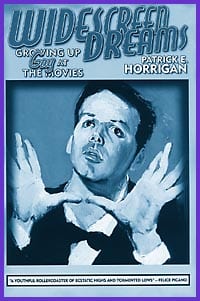Whenever I imagine my life as a movie, or, to be more accurate, the movie of my life – which is daily – it’s always John Huston’s noir masterpiece The Maltese Falcon. Why?
Three reasons: 1) everyone speaks in perfect sentences, and therefore; 2) everyone’s a liar, and so; 3) everyone’s sexy. Beats Funny Girl any day.
New York writer Patrick E Horrigan and I have a lot in common – we go to too many movies and we can’t shut up about the experience. But at least he got a book out of it.
His new memoir of a cinema-damaged childhood, Widescreen Dreams: Growing Up Gay At The Movies, is a testament to the narcotic power of cheap entertainment – it is also a chart of the plutonium-like shelf lives of Mr Horrigan’s aggressively banal obsessions.
After all, a man in early middle age who still wishes his mother was more like Julie Andrews/Maria Von Trapp is a rather cheerless spectacle. I wish my mom was more like Candace Bergen in Rich And Famous – drunk and forgetful with money.
Reading Widescreen Dreams, we follow little Patrick as he grows into a redundant faggothood (anyone who notices Barbra Streisand’s “alluring Egyptian eyes” at age 11 is already on the bus) – his gayness aided and abetted by a series of watched and rewatched iconic flicks.
Blending film studies and the hot new literary bastard science called “creative nonfiction,” Horrigan intertwines his poor-me life story with the scripts of The Poseidon Adventure, Hello Dolly, The Wiz, Dog Day Afternoon (Horrigan’s notes on Al Pacino’s performance are the best, most lucid moments) and, always, always, enough already! the cursed The Sound Of Music.
The resounding problem with Widescreen Dreams is the author’s inability to approach his obsessive-histrionic fantasies with anything resembling irony or critical distance.
For instance, Horrigan creates a pages-long fictional dialogue between himself as an imaginary child star and talk show host Dick Cavett – and he means it. Later, Horrigan confesses, without a hint of remorse or psychological insight, that when he was 11 and obsessed with The Poseidon Adventure, he wished his terminally ill cousin would die (she did) so that his real life would acquire a disaster movie glamour.
In my favourite awful section of the book, Horrigan unearths photographs of himself as a baby in his mother’s arms, and then matches those images to pictures of Barbra holding baby Jason Gould. Yuck.
By the time you’re halfway through Widescreen Dreams, you feel like you’ve been trapped in a conversation corner by one of those boorish fags who won’t shut the hell up about his one million and seven most treasured things. Horrigan needs a good clout across the head with his group therapy talking stick.
As the book concludes with Horrigan’s barely-embraced adulthood, one wonders what the author will do for a follow up, now that he’s all grown and written himself out of his (hopefully spent) source material?
And since Widescreen Dreams is largely comprised of Horrigan’s doctoral thesis, the careerist in me wants to know: How can I get a PhD in neurotic scrapbook making?
If you can learn to live on less oxygen, you might find Horrigan’s incessant narcissism perversely charming. But if, like me, you hold to the old fashioned idea that good memoirs – like good art – must reach out and offer a wider vista than that afforded by the author’s mirror, your time will be better spent at the movies.
Widescreen Dreams.
Patrick E Horrigan.
University Of Wisconsin Press.
227 pages. $39.95.
In a fundraiser for Buddies In Bad Times, Patrick E Horrigan reads from Widescreen Dreams and screens clips from movies featured in his memoir at Tallulah’s Cabaret (12 Alexander St) on Mon, Aug 2 at 8pm. Tix cost $5; save taxes if purchasing the book at the event; call (416) 961-4161.


 Why you can trust Xtra
Why you can trust Xtra


